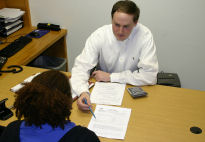Low-Income Taxpayer Clinic helps residents resolve IRS disputes
April 10, 2008

She didn't know it at the time, but for years Renee Thomas was racking up debt with the Internal Revenue Service.
When her husband died in 2003, she found out they both owed more than $41,000 in income taxes, fines and fees going back to 1998 and the bills kept mounting. Between her husband's death and the crushing financial setback, the working mother of three also found out she had breast cancer.
The Georgia State University College of Law Low-Income Taxpayer Clinic, after three years of work, helped reduce that debt to less than $6,000.
Thomas' husband, Steve, worked as a plumbing contractor before his death. The couple filed joint tax returns making them jointly liable for any money owed, but Renee had always left the paperwork up to her husband.
"He was paying all the bills at the time and I had no idea it was adding up to that much," she said.
In early 2004, while visiting her cancer treatment center, Thomas explained her problems to someone she met there who had a relative working for the IRS. The friend suggested Thomas ask Georgia State's Tax Clinic to step in.
The clinic, housed in the College of Law and led by law professor Ron Blasi, handles between 150 and 160 cases at a time, working with low-income taxpayers to resolve disputes with the IRS. Students who work in the clinic take on six to 12 cases at a time, but because many take longer than a semester to resolve, pending cases often pass down to incoming students as clinic students move on.
When Thomas' initial claims for relief under an "innocent spouse" provision of the tax code were denied in 2005 and 2006, a group of students under Blasi's direction appealed to the United States Tax Court. Third-year law student Jeffrey Phillips was part of the group that met with an attorney in the office of IRS Chief Counsel in early 2007.
"Our position was, she should be liable for her side and cut off from her husband's liability," said Phillips, noting that Steve Thomas kept a separate business bank account and cashed paychecks without mingling the money with his wife's in a joint account. "Ms. Thomas wasn't really aware of what was going on and couldn't affect what was going on."
Last summer, just before the case was set to go to trial in U.S. Tax Court, the IRS agreed to reduce Thomas' liability for the years 1998-2002 to $5,888.50 which Thomas figures is what she would've owed apart from her husband, not counting any penalties. After refinancing her Morrow home, Thomas said she was able to get out from under the debt.
"I would've been indebted to them [IRS] the rest of my life if the clinic hadn't jumped in," she said.
Phillips, who's studying for the summer bar exam and plans to work in corporate law, says the role of the Tax Clinic is not to erase taxpayers' obligations. "Our goal is not to help people evade taxes. Our goal is to help people legally reduce the tax," he said.
Blasi, who formed the Tax Clinic in 1992, says that many of the cases the clinic takes on result in settlements with the IRS, where revenue authorities agree to reduce the amount of the contested liability in exchange for some level of payment and an agreement from the taxpayer to stay up-to-date in the future. He says about 80 percent of the cases the clinic takes on are resolved in the client's favor.
"Honestly, it's quite remarkable some of the things we've been able to do for our clients," Blasi said. "The quality of service the [clients] receive, they would never possibly be able to afford."
Willard Timm, the assistant director of the clinic, worked for 30 years with the IRS legal staff. He says the clinic can help navigate the complicated and time-consuming process of negotiating with revenue officials. "If the client is doing it themselves, they might just give up," says Timm. "We have infinite patience."